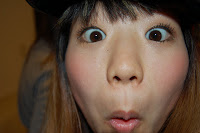 On Thursdays, I teach my Starfish classes (5yr olds) in the afternoons at Minori Gaoka, two classes back-to-back. I really look forward to these classes as my 5yr olds are generally very well-behaved (as well-behaved as 5yr old kids can be in the afternoon), so I'm able to do more with them than with my lesser-behaved classes (like my 4yr olds lol). One activity that we often do at the end of class (if time permits) is drawing. I love to draw, and so do the kids (most of them), so it's something that they all generally look forward to. Last Thursday, my first Starfish class began pretty late, so we didn't have time for drawing, so I was really looking forward to drawing with my second class.
On Thursdays, I teach my Starfish classes (5yr olds) in the afternoons at Minori Gaoka, two classes back-to-back. I really look forward to these classes as my 5yr olds are generally very well-behaved (as well-behaved as 5yr old kids can be in the afternoon), so I'm able to do more with them than with my lesser-behaved classes (like my 4yr olds lol). One activity that we often do at the end of class (if time permits) is drawing. I love to draw, and so do the kids (most of them), so it's something that they all generally look forward to. Last Thursday, my first Starfish class began pretty late, so we didn't have time for drawing, so I was really looking forward to drawing with my second class.Unfortunately, my second class, quite unusually, was pretty disruptive that d
 ay. The activities that worked really well with my other 5yr old classes were not having much success with these kids. It was the end of class, and I had given them a choice (yes, I even let them choose!) whether they wanted to play the activity for that day again, or draw. The overwhelming majority wanted to draw. However, to make it more applicable to the teaching material, I wanted the "theme" of our drawing to have something to do with the song for this month, "Pop Goes the Weasel." Because the only CD we have for this song sucks major a$$ (sorry, just being honest), I usually just sing it myself. In the afternoon classes, it's hit-or-miss whether they respond well to the song, but usually I can get them to listen and at least have a few kids participate. However, this class was differen
ay. The activities that worked really well with my other 5yr old classes were not having much success with these kids. It was the end of class, and I had given them a choice (yes, I even let them choose!) whether they wanted to play the activity for that day again, or draw. The overwhelming majority wanted to draw. However, to make it more applicable to the teaching material, I wanted the "theme" of our drawing to have something to do with the song for this month, "Pop Goes the Weasel." Because the only CD we have for this song sucks major a$$ (sorry, just being honest), I usually just sing it myself. In the afternoon classes, it's hit-or-miss whether they respond well to the song, but usually I can get them to listen and at least have a few kids participate. However, this class was differen t; NO one was listening or participating. After a few defeated attempts, I looked up at the clock and saw that it was within 1-2min of the end of class. Under normal circumstances, had we already started drawing, I wouldn't have minded sticking around a few extra minutes to allow them more time to draw. However, given their behavior (and the fact that we hadn't even started the song, let alone drawing), I just threw up my hands and said, "You know what? Owatta." (translation: "We're finished.") At first, I don't think the kids understood what was going on, but as I began gathering up my materials into my basket, and not saying a word to anyone, I think they began to understand something was up.
t; NO one was listening or participating. After a few defeated attempts, I looked up at the clock and saw that it was within 1-2min of the end of class. Under normal circumstances, had we already started drawing, I wouldn't have minded sticking around a few extra minutes to allow them more time to draw. However, given their behavior (and the fact that we hadn't even started the song, let alone drawing), I just threw up my hands and said, "You know what? Owatta." (translation: "We're finished.") At first, I don't think the kids understood what was going on, but as I began gathering up my materials into my basket, and not saying a word to anyone, I think they began to understand something was up.I couldn't speak to them. I couldn't even look them in the eyes :( After gathering everything into my basket, I began rolling up the carpet that they sit on during the lesson. THAT, probably more than anything, showed some of them that something was up (rolling up the carpet and returning it to their classroom is typically the kid's responsibility). One of the girls even began to cry a little; I think she understood she had done something wrong. Unfortunately, all I could do was look at her and say, "What?" I wanted to explain to her that her actions had consequences, that if it were my choice we'd be laughing and drawing right now. But my Japanese is nowhere near that level, so all I could mutter (in English, no less) was, "What?".
My heart broke. But what could I do? There was a side of me that desperately wan
 ted to forgive everyone and begin drawing, but then no lesson would ever be learned that misbehavior is not rewarded. So I just let my kids go, some of them probably still oblivious to what had happened, but others quite aware. They were the ones that misbehaved, that were being "punished," and yet I was the one that ended up feeling like crap.
ted to forgive everyone and begin drawing, but then no lesson would ever be learned that misbehavior is not rewarded. So I just let my kids go, some of them probably still oblivious to what had happened, but others quite aware. They were the ones that misbehaved, that were being "punished," and yet I was the one that ended up feeling like crap.As I began walking down to the first floor (the 4 & 5 yr old classrooms are on the 2nd floor), I paused. I'd considered walking back up, assembling my Starfish together, and attempting to explaining to them that what they had done was wrong, but that we're cool now, so let's draw!! I wanted things to end on a good note. But I couldn't do it. I shouldn't do it. I had to stand my ground. My actions had consequences too.
On the way home, and for most of that evening, all I could think about was what I had done. I still believe it was the rig
 ht thing to do, but it was so hard. At one point, I actually did feel like crying a little. And though this made me feel extremely vulnerable, a realization came to me: I really do love these kids. I think for me to take such a seemingly innocuous action so personally, I'd have to love them. It was also at this point that I'd made the realization that this, at least in some small way, must be what it's like to be a parent. Considering this has been one of my prayers (off & on) for the past year or so, it wouldn't surprise me if my coming to Japan to teach children were not, in part, God's method for training me to one day have kids of my own.
ht thing to do, but it was so hard. At one point, I actually did feel like crying a little. And though this made me feel extremely vulnerable, a realization came to me: I really do love these kids. I think for me to take such a seemingly innocuous action so personally, I'd have to love them. It was also at this point that I'd made the realization that this, at least in some small way, must be what it's like to be a parent. Considering this has been one of my prayers (off & on) for the past year or so, it wouldn't surprise me if my coming to Japan to teach children were not, in part, God's method for training me to one day have kids of my own. Growing up, my mother would sometimes explain to me (after punishing me) that, "it hurt me more than it hurt you." As a child (with a very sore butt), I never understood what she meant by this. I always thought it was "just something grown-ups say" so that you'd hate them less for the punishment they'd just given you. However now, without even being a parent, I think I understand what she meant.
Growing up, my mother would sometimes explain to me (after punishing me) that, "it hurt me more than it hurt you." As a child (with a very sore butt), I never understood what she meant by this. I always thought it was "just something grown-ups say" so that you'd hate them less for the punishment they'd just given you. However now, without even being a parent, I think I understand what she meant.You're right, Mom. It hurts like hell.






